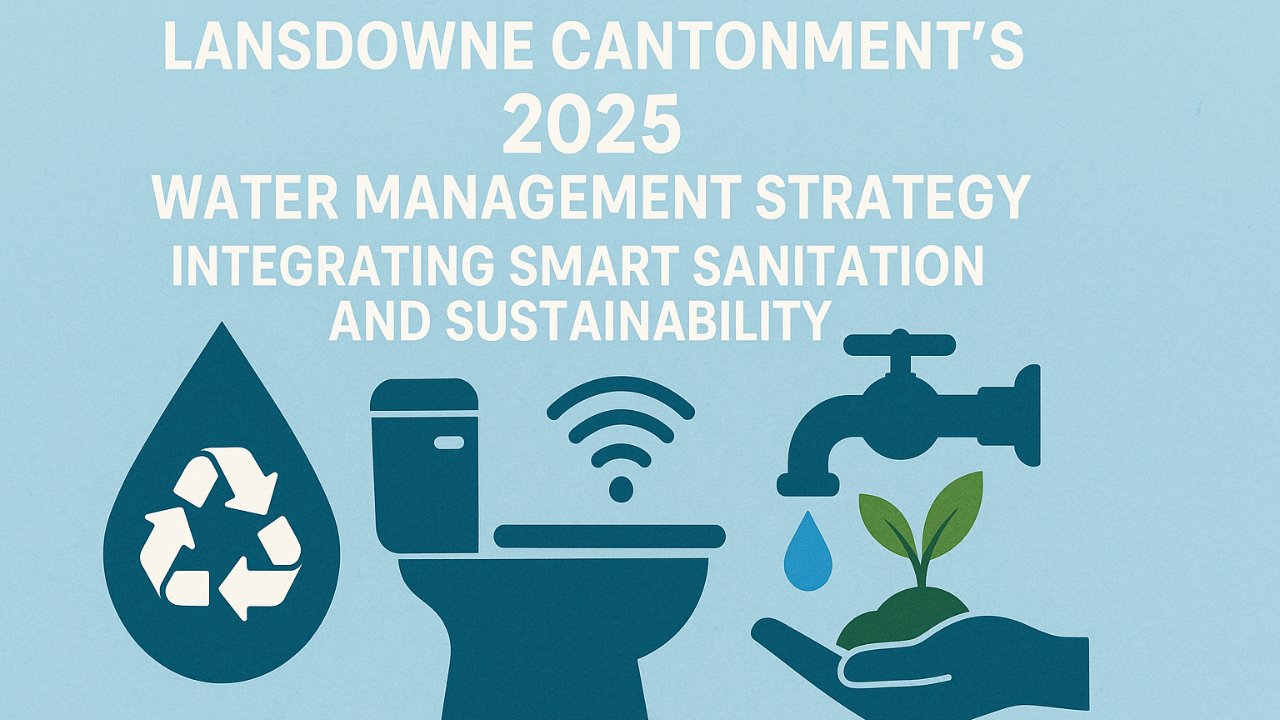Lansdowne Water Management – Nestled in the serene hills of Uttarakhand, Lansdowne Cantonment is not only known for its military heritage but is now emerging as a pioneer in sustainable water governance. In 2025, the Cantonment Board rolled out a comprehensive Water Management Strategy that revolves around “Smart Sanitation” and “Sustainability”. This plan is designed to transform water usage, waste treatment, and community engagement using modern technology and eco-conscious practices.
This article explores the pillars of this new strategy, the technology being implemented, and the positive impact it’s having on residents, the environment, and military operations.
The Water Crisis Background in Lansdowne
Lansdowne, being a hilly region, has always faced natural limitations in water supply. The primary source is rainwater, and during summers the scarcity becomes severe. Until 2020, several challenges existed:
- No proper rainwater harvesting systems
- Around 20% water loss due to leakages
- No metering or monitoring of domestic or military water usage
- Outdated sewage and sanitation infrastructure
These challenges made it urgent to adopt a futuristic, sustainable solution.
Goals of the 2025 Strategy
The newly launched 2025 strategy aims to transform how water is consumed, recycled, and monitored in Lansdowne. It focuses on:
- Installing Smart Sanitation Systems
- Achieving 100% wastewater treatment
- Adopting smart water meters for monitoring
- Making rainwater harvesting mandatory
- Implementing greywater recycling systems
- Promoting eco-friendly sanitation infrastructure
Each of these steps is aligned with environmental protection and the principles of circular water economy.

Features of the Smart Sanitation System
As part of the initiative, Lansdowne has introduced intelligent sanitation solutions throughout the cantonment.
Key Features of Smart Sanitation:
- Solar-Powered Bio Toilets: Installed across public areas and military posts with minimum water usage.
- IoT-Based Septic Tank Monitoring: Real-time data collection on tank levels, clogging, and leakage.
- Mobile Sanitation Vans: Ensuring accessible sanitation in remote and hilly zones.
- Inclusive Toilet Infrastructure: Facilities for women, persons with disabilities, and children included.
Water Recycling and Conservation Technologies
Water reuse is at the heart of the new strategy. The following techniques have been adopted to reduce dependency on fresh sources:
Key Water Technologies Implemented:
| Technology | Usage | Benefits |
|---|---|---|
| Greywater Recycling Units | Reusing water from kitchen and bathrooms | Used for plant irrigation and flushing |
| Rainwater Harvesting Pits | Capturing rooftop rainwater | Helps recharge groundwater levels |
| Smart Water Meters | Monitoring consumption, automated billing | Reduces wastage, enables data analysis |
| Leak Detection Sensors | Identifying hidden pipeline leaks | Cuts water loss by up to 40% |
| Smart Irrigation Systems | Sensor-based watering for green spaces | Water-saving and better vegetation |

Community Participation & Awareness Programs
The Lansdowne Cantonment Board recognizes that technology alone is not enough. Hence, local residents are actively involved in the program:
Community-Based Initiatives:
- Monthly Water Workshops: Awareness sessions conducted for civilians and military families.
- School Campaigns: Young students are trained as “Water Warriors” to spread the message.
- Reward Systems: Households that use below-average water are rewarded publicly.
This participative model ensures the sustainability of the initiative.
Environmental and Health Impact
The integrated strategy has shown significant positive outcomes in terms of both environment and public health:
- Contaminated water is no longer discharged into local rivers or drains.
- Waterborne diseases and infections have reduced by 60%.
- Air and hygiene standards in residential zones have improved notably.
Military Readiness with Environmental Balance
While the cantonment serves critical military functions, the strategy ensures green practices don’t interfere with operations:
- All army barracks now use smart meters and bio-toilets.
- Rainwater is used for non-potable needs in field kitchens and training zones.
- Water usage is monitored during field drills to avoid wastage.
This balance of readiness and responsibility sets an example for other cantonment areas.
Lansdowne Cantonment’s 2025 Water Management Strategy is a bold, progressive step toward building a sustainable and smart future. By leveraging technology, encouraging community involvement, and protecting natural resources, the cantonment has transformed itself into a model of eco-responsible urban planning. If adopted nationwide, this model could revolutionize how India handles its water and sanitation needs.
FAQs:
Q1. When was Lansdowne Cantonment’s new strategy implemented?
A1. The strategy officially came into effect in January 2025.
Q2. What does smart sanitation mean?
A2. It refers to sanitation systems that use IoT devices, solar energy, and eco-friendly toilets to minimize water usage.
Q3. Is this plan only for military use?
A3. No, the plan benefits both military personnel and civilian residents of the cantonment.
Q4. Is rainwater harvesting mandatory now?
A4. Yes, it is now compulsory in all new constructions within the cantonment.
Q5. Has the water quality improved under this strategy?
A5. Yes, with 100% wastewater treatment and monitoring, the overall water quality has significantly improved.






